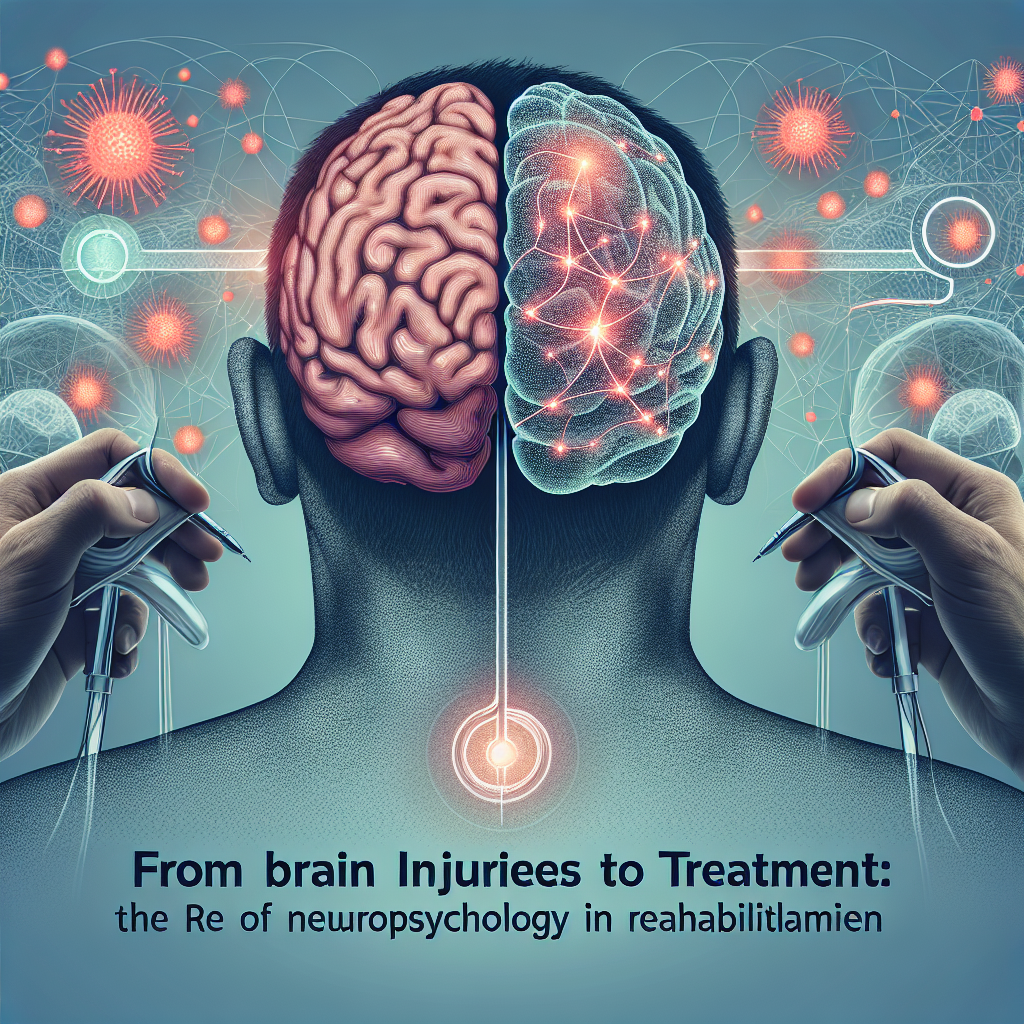
Introduction
Brain injuries can drastically alter the course of a person’s life, impacting everything from cognitive function to emotional well-being. As medical advancements continue to evolve, so too does our understanding of how to rehabilitate individuals recovering from such injuries. At the heart of this evolution lies the field of neuropsychology. This often-overlooked specialty is vital in bridging the gap between medical treatment and psychological recovery. In this article, we explore From Brain Injuries to Treatment: The Role of Neuropsychology in Rehabilitation and how it serves as a pivotal element in the recovery process.
Understanding Brain Injuries
Types of Brain Injuries
Brain injuries can be categorized broadly into two categories:
- Traumatic Brain Injury (TBI): Caused by external forces such as falls, accidents, or blows to the head.
- Acquired Brain Injury (ABI): Occurs due to events such as strokes, tumors, or infections.
Each type presents unique challenges in terms of recovery, often necessitating specialized treatment approaches.
The Impact of Brain Injuries
The repercussions of brain injuries can be profound. Cognitive dysfunctions often manifest as memory loss, difficulty concentrating, or impaired judgment. Emotional changes, including increased anxiety or mood swings, may also occur. The psychological effects can be equally debilitating, leading to conditions such as depression or PTSD.
The Relevance of Neuropsychology
Neuropsychology offers invaluable insights into understanding these complexities. This branch of psychology focuses on how brain functioning affects behavior and cognitive abilities. Therefore, the role of neuropsychology in rehabilitation cannot be overstated, as understanding a patient’s specific cognitive profile is crucial for effective treatment.
The Neuropsychological Assessment
Importance of Assessments
Before rehabilitation can commence, a comprehensive neuropsychological assessment is essential. This process evaluates cognitive, emotional, and behavioral functioning to identify deficits that may hinder recovery.
Components of Neuropsychological Assessment:
| Component | Description |
|---|---|
| Cognitive Tests | Assess memory, attention, language, and more. |
| Emotional Evaluations | Identify emotional disturbances and resilience. |
| Behavioral Observations | Understand real-life challenges the patient may face. |
Case Study: The Assessment in Action
Consider the case of John, a 28-year-old man who suffered a TBI from a car accident. Shortly after the injury, he underwent a neuropsychological assessment that revealed significant deficits in short-term memory and emotional regulation. Understanding these aspects allowed his rehabilitation team to tailor his treatment plan, emphasizing memory exercises and coping strategies for emotional distress.
Analysis
This assessment not only provided clarity on John’s impairments but also facilitated a targeted approach to rehabilitation, illustrating the essential role of neuropsychology in recovery.
Interventions in Neuropsychological Rehabilitation
Cognitive Rehabilitation Therapy
One primary intervention is Cognitive Rehabilitation Therapy (CRT), which uses various activities and exercises to help patients regain lost cognitive functions.
- Techniques Utilized: Memory training, problem-solving tasks, and attention-enhancing exercises.
Behavioral Therapy
Behavioral therapy plays a substantial role in addressing the emotional and psychological aspects of recovery. Techniques such as Cognitive Behavioral Therapy (CBT) help in managing anxiety, depression, and other emotional challenges.
Case Study: Success with Cognitive Rehabilitation
Take the example of Maria, a 35-year-old woman who experienced a stroke. Through a combination of CRT and behavioral therapy, she was able to improve her cognitive functioning and regain her confidence. The neuropsychologists identified specific areas of difficulty and adjusted her therapy accordingly, enabling her to return to work successfully.
Analysis
Maria’s case demonstrates how targeted interventions rooted in neuropsychological assessments can lead to effective rehabilitation, embodying the theme of From Brain Injuries to Treatment: The Role of Neuropsychology in Rehabilitation.
Multidisciplinary Approach to Rehabilitation
Collaboration between Professionals
Neuropsychologists often collaborate with various specialists, including neurologists, occupational therapists, and speech therapists, to formulate a comprehensive treatment plan.
Benefits of a Multidisciplinary Team
- Holistic Care: Each professional brings unique perspectives and expertise.
- Shared Goals: Coordinated efforts lead to more effective outcomes.
Case Study: The Power of Teamwork
Consider Alex, a 42-year-old man recovering from an ABI due to a brain tumor removal. A multidisciplinary team, including neuropsychologists, occupational therapists, and physical therapists, worked together to create a comprehensive rehabilitation plan. This collaboration ensured that all areas of his recovery were addressed—from improving cognitive skills to enhancing physical mobility.
Analysis
Alex’s successful recovery highlights the importance of teamwork in rehabilitation, further showcasing the integral role of neuropsychology in orchestrating patient-centered care.
Challenges in Neuropsychological Rehabilitation
Barriers to Effective Treatment
Despite its affirmed importance, neuropsychological rehabilitation faces challenges:
- Insurance Limitations: Coverage for neuropsychological services can be inconsistent.
- Access to Services: Availability of qualified neuropsychologists may be limited, especially in rural areas.
Addressing the Challenges
- Advocacy for Coverage: Greater awareness is needed regarding the value of neuropsychological services in recovery.
- Telehealth Expansion: Embracing technology can improve access to neuropsychological care for more patients.
Inspiring Future Prospects
As our understanding of brain injuries deepens, the role of neuropsychology continues to evolve, embracing innovative treatment approaches. This evolution prompts optimism for improved recovery trajectories for countless individuals suffering from brain injuries.
Conclusion
The journey from brain injuries to treatment is complex, encompassing an intricate interplay of medical, psychological, and rehabilitative processes. As we’ve explored, neuropsychology plays a critical role in navigating this journey, offering invaluable insights and interventions tailored to individual patient needs. It’s not merely about healing the brain; it’s about restoring lives.
Motivational Takeaway
As you journey through recovery, remember that every step, no matter how small, is significant. Be proactive, engage with your rehabilitation team, and advocate for the neuropsychological care you need. Together, we can pave the way for a brighter future following a brain injury.
FAQs
1. What is the role of a neuropsychologist in rehabilitation?
Neuropsychologists assess cognitive and emotional functions to create tailored treatment plans, helping patients recover from brain injuries.
2. How long does neuropsychological rehabilitation take?
The duration varies by individual needs and injury severity, but many patients see significant improvements within months of starting therapy.
3. Can neuropsychology help with emotional issues after a brain injury?
Yes! Neuropsychological interventions are effective in addressing emotional disturbances caused by brain injuries, such as anxiety and depression.
4. Are neuropsychological assessments covered by insurance?
Coverage can vary widely. It is advisable to check with your insurance provider regarding specific neuropsychological services.
5. How can family members support someone in neuropsychological rehabilitation?
Family support is crucial. Engaging in therapy sessions, participating in exercises, and understanding the patient’s needs fosters a conducive recovery environment.
By understanding From Brain Injuries to Treatment: The Role of Neuropsychology in Rehabilitation, we arm ourselves with knowledge to drive effective recovery, embracing both medical and psychological pathways for a fuller life post-injury.

















